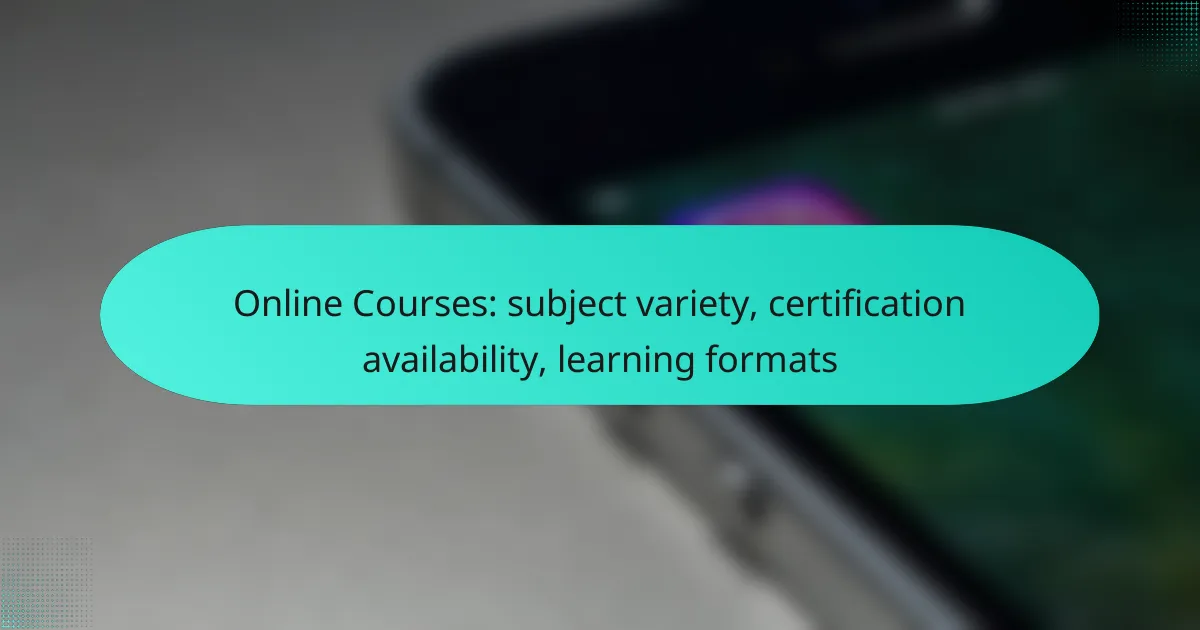Online courses offer a wide array of subjects and formats, catering to different learning preferences and professional needs. From academic topics to creative skills and technical training, learners can choose from self-paced, live virtual, or hybrid models. Additionally, many courses provide certification options from accredited institutions, enhancing your qualifications and appeal to employers.

What types of online courses are available?
Online courses come in various formats and subjects, catering to diverse learning needs. These include professional development, academic subjects, creative skills, technical training, and language learning.
Professional development courses
Professional development courses are designed to enhance skills relevant to your career. They often focus on leadership, project management, and industry-specific knowledge.
Many of these courses offer certifications that can boost your resume and demonstrate your commitment to continuous learning. Look for programs accredited by recognized organizations to ensure quality and recognition.
Academic courses
Academic courses cover a wide range of subjects, from humanities to sciences, and can often be part of degree programs. These courses are typically offered by universities and may provide credits that count toward a degree.
When selecting academic courses, consider the institution’s reputation and the course’s alignment with your educational goals. Some platforms offer free courses, while others may charge tuition fees similar to traditional universities.
Creative courses
Creative courses focus on artistic skills, including photography, writing, music, and graphic design. These courses often encourage self-expression and can be taken for personal enjoyment or professional growth.
Many platforms offer project-based learning, allowing you to build a portfolio as you progress. Look for courses that provide feedback from instructors or peers to enhance your learning experience.
Technical courses
Technical courses are geared towards skills in fields like programming, data analysis, and cybersecurity. These courses are often hands-on, providing practical experience with tools and technologies.
Consider courses that offer real-world projects or internships, as these can significantly enhance your employability. Certifications in high-demand areas, such as cloud computing or AI, can also be valuable for career advancement.
Language courses
Language courses help learners acquire new languages through various methods, including interactive lessons and immersion techniques. These courses can range from beginner to advanced levels and often focus on speaking, writing, and comprehension skills.
When choosing a language course, consider the teaching style and resources available, such as conversation practice with native speakers. Many platforms offer free trials, allowing you to assess the course before committing financially.

How can I earn certifications from online courses?
You can earn certifications from online courses by completing programs offered by accredited institutions, industry-recognized organizations, or through micro-credentialing platforms. These certifications can enhance your resume and demonstrate your skills to potential employers.
Accredited institutions
Online courses from accredited institutions provide recognized certifications that can significantly boost your qualifications. Many universities and colleges offer online programs that lead to degrees or certificates, ensuring that the education you receive meets established standards.
When selecting a course, verify the institution’s accreditation status. Look for regional or national accreditation, which indicates that the program meets specific educational quality benchmarks. This can be crucial for employers who value degrees from reputable sources.
Industry-recognized certifications
Industry-recognized certifications are awarded by professional organizations or companies that are well-respected in specific fields. These certifications demonstrate your expertise in particular skills or technologies, making you more attractive to employers.
Examples include certifications from tech giants like Microsoft, Cisco, or CompTIA. These organizations often have rigorous testing and training requirements, ensuring that you gain relevant and up-to-date knowledge in your industry.
Micro-credentials
Micro-credentials are short, focused courses that allow you to gain specific skills and earn a certificate upon completion. They are often more flexible and less time-consuming than traditional degree programs, making them ideal for busy professionals.
Many platforms, such as Coursera and edX, offer micro-credentials in various subjects, from data analysis to digital marketing. These can be a cost-effective way to enhance your skill set without committing to a full degree program.

What learning formats do online courses offer?
Online courses provide various learning formats to accommodate different preferences and schedules. The most common formats include self-paced learning, live virtual classes, and hybrid models, each offering unique benefits and considerations.
Self-paced learning
Self-paced learning allows students to progress through course materials at their own speed. This format is ideal for individuals with busy schedules or those who prefer to take their time to fully understand the content.
When engaging in self-paced courses, learners can access recorded lectures, readings, and assignments whenever they choose. However, it’s essential to establish a personal timeline to maintain motivation and avoid procrastination.
Live virtual classes
Live virtual classes involve real-time instruction through video conferencing platforms, enabling direct interaction with instructors and peers. This format mimics traditional classroom experiences, fostering engagement and immediate feedback.
Participants should ensure they have a reliable internet connection and a suitable device for attending these sessions. While live classes offer structured learning, they require adherence to a set schedule, which may not suit everyone.
Hybrid models
Hybrid models combine elements of both self-paced learning and live virtual classes. Students may complete certain coursework independently while also attending scheduled live sessions for discussions or assessments.
This format offers flexibility and the benefits of both approaches, allowing for personalized learning while still providing opportunities for interaction. However, it requires careful time management to balance both aspects effectively.

What are the benefits of online courses in the US?
Online courses in the US offer numerous advantages, including flexibility, access to a wide range of resources, and cost-effective learning options. These benefits cater to diverse learning needs and schedules, making education more accessible than ever.
Flexibility in scheduling
One of the primary benefits of online courses is the flexibility they provide in scheduling. Learners can choose when and where to study, allowing them to balance education with work and personal commitments. This is particularly advantageous for those with busy lifestyles or irregular work hours.
Many online courses are asynchronous, meaning students can access materials and complete assignments at their own pace. This flexibility can lead to a more personalized learning experience, as individuals can allocate time based on their unique needs and preferences.
Access to diverse resources
Online courses grant access to a vast array of resources that may not be available in traditional classroom settings. Students can utilize multimedia content, including videos, podcasts, and interactive simulations, enhancing their understanding of complex subjects. Additionally, many platforms offer forums and discussion groups to foster collaboration and peer support.
Furthermore, learners can tap into specialized resources tailored to their specific interests or career goals. This variety allows for a more comprehensive educational experience, catering to different learning styles and preferences.
Cost-effective options
Online courses often present more affordable options compared to traditional education. Tuition fees for online programs can be significantly lower, and students save on commuting and housing costs. Many platforms also offer free or low-cost courses, making education accessible to a broader audience.
When considering online courses, it’s essential to evaluate the total cost, including any materials or certification fees. Some platforms may offer financial aid or payment plans, further reducing the financial burden on students. Always compare options to find the best value for your educational investment.

How do I choose the right online course?
Choosing the right online course involves aligning your personal goals with the course content and evaluating the instructor’s qualifications. Start by identifying what you want to achieve, then ensure the course meets those needs while being taught by a credible expert.
Assess personal goals
Begin by clearly defining your objectives. Are you looking to gain new skills for career advancement, explore a hobby, or fulfill educational requirements? Understanding your motivation will guide your selection process.
Consider the time commitment you can realistically make. Some courses require only a few hours a week, while others may demand a more intensive schedule. Be honest about your availability to avoid frustration later.
Evaluate course content
Review the course syllabus and learning outcomes to ensure they align with your goals. Look for courses that offer practical, hands-on experience or projects that reinforce learning. This is particularly important if you’re seeking skills applicable in a job setting.
Check for any prerequisites or recommended knowledge. Some courses may require a foundational understanding of a subject, which can influence your decision if you’re starting from scratch.
Check instructor credentials
Investigate the background of the course instructor. Look for their educational qualifications, professional experience, and any relevant certifications. An instructor with real-world experience can provide valuable insights that enhance your learning.
Read reviews or testimonials from previous students to gauge the instructor’s teaching effectiveness. Positive feedback can indicate a strong ability to communicate complex concepts clearly, which is crucial for online learning.

What platforms offer online courses?
Numerous platforms provide online courses across various subjects, catering to different learning preferences and certification needs. Popular options include Coursera, Udemy, edX, and LinkedIn Learning, each offering unique features and course selections.
Coursera
Coursera partners with universities and organizations to offer a wide range of online courses, specializations, and degrees. Users can access courses in fields like technology, business, and health, often taught by professors from renowned institutions.
Courses on Coursera typically include video lectures, interactive quizzes, and peer-reviewed assignments. Many courses offer the option to earn certificates upon completion, which can enhance resumes and LinkedIn profiles.
When choosing a course on Coursera, consider the level of commitment required, as some specializations may take several months to complete. Look for courses that fit your schedule and learning style, and take advantage of free trials or financial aid options if available.
